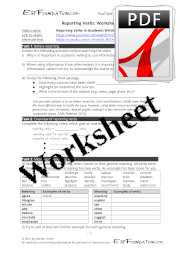AWL
Words on this page from the academic word list
Show AWL words on this page.
Show sorted lists of these words.
Donate
Dictionary
Look it up
Any words you don’t know? Look them up in the website’s built-in
dictionary.

clicking here.
This message will disappear when then podcast has fully loaded.
This page discusses academic vocabulary. It begins by considering a
definition of academic vocabulary, then looks at different types of vocabulary used in academic contexts, namely
general words, non-general
‘academic’ words, and
technical words.
Another important feature of academic vocabulary,
nominalisation, is also considered.
What is academic vocabulary?
For another look at the same content, check out the video on YouTube (also available on
Youku). There is a worksheet (with answers and teacher’s notes) for this video.
Academic vocabulary can be difficult to define. One broad definition is the vocabulary which can be used in academic contexts.
The problem here though is what do we mean by ‘academic contexts’? Does this mean spoken contexts (e.g. lectures, seminars, presentations),
written contexts (e.g. essays, articles, reports), or both? Writers on academic vocabulary tend to focus on the latter, and often
overlook the former. It also depends on what subject we are talking about. The academic vocabulary necessary for
writing a science laboratory report (e.g. apparatus, procedure, errors) has some differences from the academic vocabulary
which might be used in social science research (e.g. survey, population, sample),
though of course they would also have much in common.
In general, academic vocabulary can be considered to consist of three types of vocabulary:
- general words which are acceptable for academic use;
- non-general ‘academic’ words;
- technical words specific to an individual subject area.
Each of these is described in more detail below.
General words which are academic
The
General Service List (GSL) is a useful starting place to identify general English words. Many of the
words in the GSL can be used in academic contexts. Consider these examples, all of which contain only words from the GSL, but all of which are acceptable in
academic speech or writing:
- The aim of this report is to… [see language for reports]
- What I want to talk about today is… [see language for presentations]
- There are several possible reasons for this, for example… [giving reasons, giving examples]
- In comparison, the control group… [comparing]
There are, however, many words from the GSL which are not academic. Consider these examples:
- Spoken English is more informal than academic English. It uses phrases like ‘like’ and things like that.
- Acid rain is a bad thing for all of us.
These examples contain several words and phrases which would not be considered good academic style,
for example like (to give examples), thing, and bad. These three words are also in the GSL.
In this case, the important consideration is tone: words and phrases such as aim, report,
reasons, for example, and in comparison are all academic in tone, while
like, thing, and bad are not. For this reason, when studying words for academic use, it is important to
know whether they are
academic (formal) or not.
General vocabulary can also include general words which have special meaning in academic contexts. Examples include:
discipline
- general meaning: training people to obey rules
- academic meaning: a subject of study
population
- general meaning: the number of people living in a country/region
- academic meaning: all individuals who could possibly be included in a study/survey
control
- general meaning: power over sb/sth
- academic meaning: a group used in a scientific experiment to check results
In this case, it is important to focus on both the
meaning and
usage of these general vocabulary items.
Academic words and word lists
Researchers have long been interested in creating a list of
words which are not common enough for students to learn through ordinary study,
but which are frequent in all or most academic disciplines and can therefore be studied by all EAP learners.
This type of vocabulary has various names, e.g. sub-technical vocabulary or specialised non-technical vocabulary.
Perhaps the most well known example of such a list is the
Academic Word List (AWL). This can be a useful resource for building
general academic vocabulary, though it should be remembered that this list is derived from written academic texts, so is most useful for
written contexts. It is also important to use the list appropriately: do not just try to learn all the words. A useful tool is the
AWL highlighter, which will help you study the words in context,
as well as giving definitions, pronunciation and examples sentences.
A second and similar list is the
New Academic Word List (NAWL), which seeks to create a more updated list of academic words, since it is founded on the
New General Service List (NGSL), from 2013, in contrast to the AWL which is founded on the
General Service List (GSL) dating from 1953.
There are two other commonly used lists for academic English. One is called the
Academic Collocation List, or ACL for short. This lists commonly used
collocations in written academic texts (e.g.
vast array, great accuracy). The other is called the
Academic Formulas List, or AFL for short. This lists commonly used
formulaic sequences in academic English (e.g.
in terms of, at the same time). As with the AWL, both of these lists were produced following extensive research.
The lists above are intended for all or most disciplines. Some researchers are also creating academic word lists for specific
disciplines. These are different from technical words (see below) since these lists comprise non-technical words, that learners
may not find defined in their course of study, and may be unfamiliar with since they are non-general words. An example is the
Economics Academic Word List (which is included on this site, along with an
EAWL highlighter).
Technical words
The final type of words you need to study to improve your academic vocabulary is technical words, or words which are
particular to your field of study. Examples are photosynthesis (for biology), inertia (for physics),
externalities (for economics).
More information about this type of word can be found on the
technical (subject specific) vocabulary page of the website.
Nominalisation (noun phrases)
Another feature of academic vocabulary which deserves mention is the use of nominalisation or noun phrases. Study the following examples:
|
Acid rain |
erodes |
buildings, which is a major problem. |
|
s |
v |
|
The erosion of buildings by acid rain |
is |
a major problem. |
|
s |
v |
In the first example, ‘acid rain’ is the subject (shown by ‘s’) and ‘erodes’ is the verb (shown by ‘v’).
In the second example, which many would consider to be more academic, the subject has been made
more complex by changing the verb into a noun and creating a noun phrase ‘the erosion of buildings by acid rain’.
This type of nominalisation is common in academic writing.
For this reason, it is important to study the
word family of a word, rather than just one word form, especially if the word is not a noun.
Conclusion
In sum, academic vocabulary is difficult to define, because it depends very much on what kind of context
we are talking about. For example, spoken academic language differs from written academic language (though they also have much in common);
the language for biology differs from the language for economics, especially in the technical language they use
(though again, they have much in common).
The main issue for EAP students is to raise your awareness of which
general words are formal enough to use in academic writing, build your knowledge of common
academic words, and study and learn the
technical vocabulary which is used in the discipline you are studying (or plan to study).
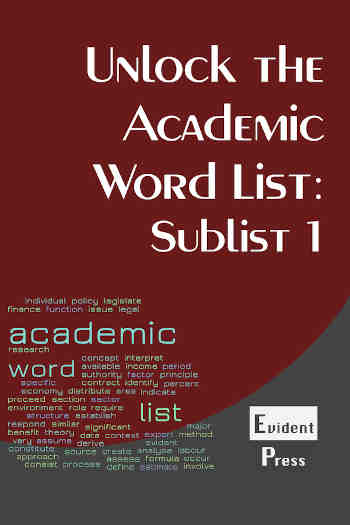
GET FREE EBOOK
Like the website? Try the books. This extract from Unlock the Academic Wordlist: Sublists 1-3 contains all sublist 1 words, plus exercises, answers and more!

Vocabulary, as a whole, is known as a collection of words that can be used in a similar context or not. English vocabulary is one of the most difficult aspects to tackle in English especially for second language speakers or learners. Based on where the language is to be used, there are different types of vocabulary that a person may need to know.
One of such types is the academic vocabulary. What is academic vocabulary, its types, uses, examples, and how it is taught? We would look into all that pertains to academic vocabulary as we go on.
What Is Academic Vocabulary?
Academic vocabulary is generally used to refer to words in an academic context. These words are used in academic dialogues and texts and do not usually occur in a day to day conversation. Academic vocabulary words are used in classrooms, tests, examinations, thesis papers and so on. The academic vocabulary definition covers a wide range of words used in a formal environment.
Academic words help build the students’ knowledge of a particular subject or domain. It gives the necessary skills to digest and reproduce the knowledge they have. Academic vocabulary words are used in spoken and written contexts. In teaching academic vocabulary, there are academic writing words and spoken words. Other than this broad classification, academic vocabulary consists of two major types.
Types Of Academic Vocabulary
Academic vocabulary can be divided into two types. They are:
- General Academic Vocabulary
General academic vocabulary consists of words that are commonly used in the academic context. While some are more general than others, some general academic words set the tone of the writing or speech to show it is formal or academic writing. For instance, in a phrase like ‘the aim of this report is to…’ the words, aim, and report are general academic words. While the other words in the phrase like this, the, and to are just more general words used in an academic context. Words used in academic contexts to link other words are known as academic transition words. These words are more general than others.
There are also words in the general vocabulary that have a general meaning and another meaning in academic use. Words like discipline. This word means generally to train people to obey but in academic use, it means a subject of study. Another word in this category is the word, control. In general, the word means power over something or somebody but in academic use, it might mean the group used in an experiment to test results. The meaning and use of the words in the general vocabulary list must be considered before they are understood in the academic context. For words on the general academic vocabulary list, academic vocabulary in use is different from its general meaning or use.
- Technical Academic Vocabulary
These words are essential academic vocabulary. These words are peculiar to a particular field and will only be understood in their context. There are various subject-specific academic vocabulary lists. For example, inertia (used in physics), photosynthesis (used in biology), externalities (used in economics).
In this type, there are certain words with more than one meaning depending on the subject in which the word is used. For example, the word class in general academic use is students taught together. In biology, it is a taxonomic group with one or more orders.
Over time, teachers of languages especially the English language have complied lists of words used in academic context by levels of grade. Students can learn academic vocabulary by grade level. They can use a daily academic vocabulary online to learn more about these words.
Academic Vocabulary Lists
In a bid to help students learn the words in an academic context, various resources have been provided by teachers. Most of these resources are vocabulary lists that students can visit to update their knowledge of these words. Some of these resources provide the meaning and usage of the words in context while in others, you will have to find that out on your own.
Note that these lists are by no means complete, you will have to do personal deeper research to proclaim a sound knowledge of academic vocabulary.
One of the popular compilations is the Academic Word List (AWL). You can use this resource to build your academic vocabulary for the written context. The AWL Highlighter will also help you study the definitions, pronunciation, sentence examples of the words and the appropriate usage of the words in context.
The New Academic Word List (NAWL) is a similar, updated list which can also be used. For Academic English, you can use lists like the Academic Collocation List (ACL) and the Academic Formulas List (AFL). The ACL consists of collocations used in written contexts in English academic texts. AFL consists of formulaic sequences that can be used in English academic writings.
There are also special academic lists created for various courses of study. Users can use them to learn words related to their field. The Economics Academic Word List (EAWL) is one such list and it also has an EAWL Highlighter that can be used to understand the words.
Examples Of Academic Vocabulary By Grade Level
An academic vocabulary list by grade level can be used to teach students at different levels of technical and general words that they can use to excel in academic contexts whether in writing or speech. There are various examples of academic vocabulary on each level. This is very basic, but it might give you a better idea of what to expect if you are, for example, working on English dissertation writing. You can also use some of the examples below to gauge the level at which your students need to start expanding their knowledge of academic words. To be on the safe side, you can consult professional writers, who will answer all the questions you may have.
- Grade 1: odd, minus, equal, noun, city
- Grade 2: fiction, prey, behavior, pound, graph
- Grade 3: agriculture, economy, perimeter, glossary, multiple
- Grade 4: bay, preface, sediment, evidence, stationary
- Grade 5: compromise, religion, slavery, conjunction, onomatopoeia
- Grade 6: appositive, propaganda, membrane, mutualism, niche
- Grade 7: patterns, density, temperature, maneuver, immigration
- Grade 8: elaboration, techniques, dependency, examination, hygiene
- Grade 9: conservation, allegory, implicit, democracy, campaigning
- Grade 10-12: naturalization, jurisdiction, synthetic, aesthetic, ballad
Academic vocabulary is important to learning especially when learning any language as a second language. Second language users of English have adequate resources to make learning academic words in English easy. Based on your grade level, you can dive into the meaning and use of words in an academic context.
Need Help Writing Your Thesis?
You might still feel your knowledge of English academic vocabulary is not up to standards. That is totally fine! You might feel that your papers or thesis need to sound smarter and more academic. Well, there is always our custom thesis writing service that provides high quality expert help. Any teacher or professor will absolutely love our work, and most of all it is all very secure. We uphold security and privacy standards at the highest standard. Enjoy a stress free academic life while our writers work on your thesis.
Improving academic vocabulary skills is an important aspect of any language study at university level. Academic vocabulary can be seen everywhere: in textbooks, journals, lecture handouts, exam papers, essays, assignments, etc. However, vocabulary skills do not improve simply through a natural, effortless process; one has to be as ‘active’ as possible in dealing with vocabulary, right from the start.
The harder you work on your vocabulary, and the more actively you study, the better your assignments will be, and the more efficient your reading will be too. So the rewards from studying vocabulary are considerable.
Key advice
1. What is academic vocabulary? Are there any academic word lists?
2. How can I learn vocabulary quickly?
- Recommended books
- Ten best tips for improving one’s use of academic vocabulary
What is academic vocabulary? Are there any academic word lists?
There have been many attempts to define what exactly academic vocabulary is. Many people think that academic vocabulary is more ‘difficult’ than general English vocabulary. However, academic vocabulary is not necessarily ‘difficult vocabulary’; using academic words is more a question of finding appropriate language, in a suitable style, than anything else.
As this web page is essentially a practical one, designed for students rather than researchers, we will indicate only one piece of research that is likely to be particularly useful. This is the AWL (Academic Word List); a list of academic words devised by Averil Coxhead, a researcher based in New Zealand.
In order to build up this word list, Coxhead spent some time placing on computer several hundred written academic texts (that is, about 3.5 million words in total). She then analysed them to see which ones were used most frequently.
The 570 words on the Academic Word List are all thought to be important for students preparing for academic study. If you study these words, and try to use them actively, it will help you to use English vocabulary more successfully, regardless of your study discipline.
The AWL can be accessed at the following website: http://www.victoria.ac.nz/lals/resources/academicwordlist/
There are some exercises on the sub-lists here.
back ^
How can I learn vocabulary quickly?
It can be very difficult to learn new words or phrases. Academic language can often seem very abstract and the more abstract it is, the less memorable it is. In order to improve one’s use of academic vocabulary, it is useful to bear in mind some of the principles of what may be termed ‘accelerated learning’.
There are six generally agreed ‘stages’ of accelerated learning; these are as follows :
- Getting into a suitable state of mind.
- Using the senses to acquire information.
- Understanding what you are trying to learn.
- Memorising what you are trying to learn.
- Using what you are trying to learn actively.
- Providing feedback on what you have learned.
Most of us are very familiar with the first four of these procedures, but in fact, very few of us may manage to use actively the language that we have learned (or think we have learned), as in Stage 5. This is a big part of the problem; the words we come across very often stay at a ‘receptive’ level, and do not quite reach our active vocabulary.
So — what can we do to actively use what we are trying to learn? Some suggestions that have been made by our students in the past are as follows :
- Use mind maps to draw relationships between different words.
- Put word families/groups on one page in your vocabulary book.
- Listen to classical music (Mozart is best) before you work.
- Use mnemonic devices (that is, a word whose first letters give you the key to other important words).
- Put key words into a short story.
- Talk to someone else about what you have learned.
- Imagine the most absurd scenario to make the information more memorable.
- Write words and vocabulary notes using different colours.
- Walk around as you are trying to remember; movement helps. I did most of my revision for my RSA teaching diploma examinations by walking along the beach at Westgate carrying cue cards (true story!), not sitting at my desk.
- In short, never just do nothing — always do something!
back ^
Recommended books for developing academic vocabulary
We especially recommend:
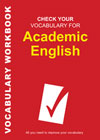
This book is based on research by I.S.P. Nation (1990), who drew up a well-known vocabulary list of 800 items ranked according to their frequency, across a range of academic texts.
David Porter uses this academic word list as the basis for a range of useful exercises: filling in the gaps, choosing the right word, word substitution, collocations and sentence completion.
This book is ideal for self-study.
back ^
Ten best tips for improving one’s use of academic vocabulary
Learning vocabulary effectively is linked to one’s preferred learning style, and so is a very personal matter; what works for one student may not work for another. Some students like to stick Post-it notes on their door to remind them of the words; others prefer to learn lists of unconnected words, out of context. One student I remember tried to learn the dictionary from A to Z, highlighting words that he didn’t know. This may seem a very bizarre strategy to some, but at least it worked, in a sense, for the student concerned. The important thing to remember is that there is no ‘do nothing’ option — whatever you do to learn vocabulary is always better than doing nothing at all and hoping that vocabulary will be acquired ‘naturally’.
Here are some further tips:
- Read actively with paper and pencil to hand and make a note of academic words and phrases that seem to be particularly useful and try and learn them.
-
Note how experienced writers use vocabulary, and try to imitate their use of it if you can (without copying ideas, of course).
-
Explore relationships between words. For most people, learning vocabulary remains at a surface level and simply involves memorising the word or phrase in translation, however, try to look at relationships between words (e.g. word families) and word formation (e.g. prefixes, suffixes, etc).
-
Use Latin-based words in favour of phrasal verbs where you have a choice e.g. ‘to get on with’ could be replaced by ‘to have a good relationship with’. This is referred to as a ‘lexical shift’, and is important in academic writing .
-
Use a dictionary and thesaurus where appropriate; do not just assume that a word exists without checking it first.
-
Make sure you write the word you are using in the correct part of speech; do you need the noun form, the verb form or the adjective?
-
Avoid the use of ‘boring’ words such as ‘advantage’, ‘problem’, ‘good’, ‘bad’, ‘interesting’ and replace these with something more descriptive.
-
Do not use the same word twice in a sentence or close together in a paragraph or text.
-
Aim to express your meaning very precisely. For example, note the difference between apparently similar verbs such as ‘suggest’, ‘indicate’, ’emphasise’, ‘point out’.
And perhaps most importantly of all:
-
Try to keep good vocabulary records; your records should include, as a minimum, the word or phrase, a translation, information about how to pronounce the word (word stress, phonetics, etc), an example of the word or phrase in a sentence, etc. Make a conscious decision as to whether you want to use the words actively (active vocabulary) or whether you just want to be able to recognise them (passive vocabulary).
back ^
When you start studying for university, you often hear people talk about “academic” vocabulary. This is a very vague term and can be a worry.
What is this academic vocabulary? How can I learn it? Will I lose marks if my vocabulary isn’t academic enough?
The result can often be that students go to the Thesaurus and try to find academic synonyms for words that they already know. So instead of saying “get”, they say “obtain”. They no longer “buy” coffees – instead they “purchase” them. And forget about “say” – from now on, everything is “stated”, “observed” and “argued”.
For the most part, this isn’t a terrible approach. However, it can be a little bit problematic, especially as some people end up addicted to the thesaurus and find synonyms for everything! If someone becomes really addicted, then words like people become too simplistic – now it has to be individuals, citizens, humanoids. Friends did an episode once where Joey became addicted to the Thesaurus and people couldn’t understand him anymore (click here to watch).

In academic writing, a lot of people use “DUE TO” incorrectly. Here is an example:
“The environment is in danger due to many people do not recycle their waste.”
In this instance, I believe, the student has decided to use “DUE TO” because they believe it is a more academic version of “BECAUSE”. If you read the sentence with BECAUSE, the grammar works perfectly. The problem is that “DUE TO” has a similar meaning to “BECAUSE” but it is used differently. Really, to work as a synonym for “BECAUSE”, you would have to say “DUE TO THE FACT THAT”.
“The environment is in danger due to the fact that many people do not recycle their waste.”
Now, the sentence is fine.
If you want to use “DUE TO”, then you would use it when you use “BECAUSE OF”, as in this example:
“The plane was delayed because of bad weather.”
“The plane was delayed due to bad weather.”
So, going back to Academic vocabulary. What is it?
The point I am trying to make is that academic vocabulary is not simply swapping words you know for more fancy, smarter words. This can work sometimes, but other times it can create problems as different words can have the same meaning, but different grammar.
Really, academic vocabulary is just vocabulary. And all vocabulary really is about communicating ideas. If you have the idea that you are hungry, then you use the word hungry, and hopefully someone will give you some food. To use the word hungry correctly, you have to understand the idea of “being hungry”. The same is true for academic vocabulary. It is the language used in universities to communicate ideas.
So the best place to start is trying to understand the ideas – reading, going to lectures, discussing with classmates. I believe that is a better approach than finding a synonym for every new idea you come across.
Recent Posts
Daily Academic Vocabulary is designed to support students to build the academic language skills needed to be successful in school. While many students have a strong conversational vocabulary, they lack the exposure and understanding of the Tier 2 words commonly used in the classroom and on standardized assessments.
While this is common, and often addressed, for students identified as English Language Learners (ELL), there are many non-ESL students who face the same language struggles as their peers learning English.
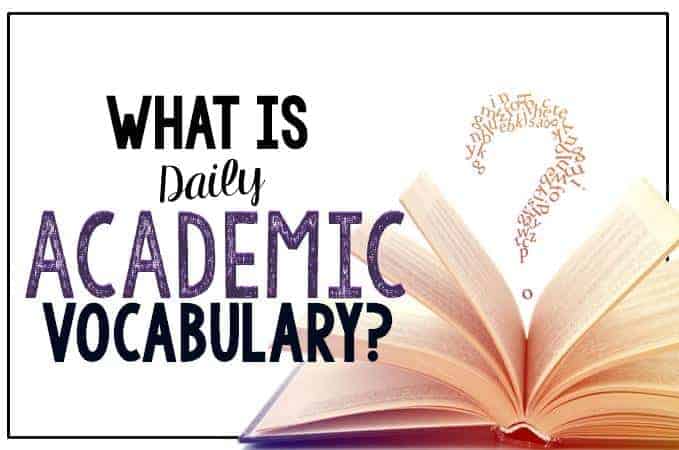
What you’ll find on this page:
What is academic vocabulary?
Academic vocabulary is the term for the language students hear in school that is uncommon in their everyday conversations. It is, at its core, the language of school. Academic vocabulary words are the terms students must know to comprehend assignments and directions in class.
While some may suggest that this is “testing vocabulary”, the language of standardized testing is just one piece of academic language. The vocabulary of standardized assessments is comprised of verbs and nouns that push students to dig deeper into the subjects of their learning. Words like analyze and outline are examples.
Identified in the standards as Tier 2 and Tier 3 words, developing academic language is an important piece of understanding and performing well in school. Being able to quickly recall academic vocabulary definitions can help students better comprehend discussions, assessments, and assignments.
What’s the difference between Tier 2 and Tier 3 vocabulary?
Tier 2 vocabulary are the general academic words that apply across all subjects, while Tier 3 words are specific vocabulary aligned to a specific area of study. For example, physical properties is a Tier 3 academic vocabulary term a student would need to be familiar with in science. However, generate is a Tier 2 word that students may see in many different subject areas.
How does academic vocabulary fit with the standards?
The Common Core State Standards include the important academic vocabulary students must know by grade level within the standards. This is also true of other state standard systems, where the important verbs and nouns of academic language are clearly identified within each standard to help teachers identify exactly what students must be know and be able to do.
Why do we need to teach academic language?
While having a definition of academic vocabulary is helpful, it is important to understand why we must teach academic vocabulary.
All students, but especially those that struggle academically, need explicit direct instruction in academic vocabulary. This helps students learn to navigate and succeed in school by providing them with a foundation to build their subject-level understanding.
Breaking down these words and helping students build them into their own vocabulary is crucial for long-term academic success.
After working with numerous students where academic vocabulary was their main barrier to school success, I decided to study strategies for teaching vocabulary and developed Daily Academic Vocabulary as a result of what I learned.
Daily Academic Vocabulary is 36-week vocabulary program with daily activities that focus on deeply studying one grade-level appropriate, commonly utilized word per week.
Students begin the week with activities to increase exposure and explore the word’s meaning, and as the week continues, they transition to higher-level tasks including analysis and application.
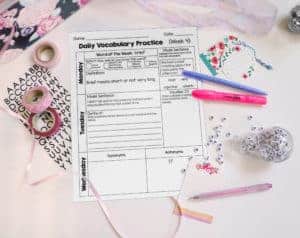
Designed to be used as a short warm-up or culminating activity, the daily tasks focus require students to spend no more than 10 minutes per day working with the word of the week. However, that time is purposefully designed to build a deep, rich understanding across the course of 5-days.
While this product can be used for targeted intervention or tutoring, it is also a great activity for whole class review and discussion.
What does a week of Daily Academic Vocabulary look like?
Like I mentioned above, the goal is to build a deep understanding and help students master the new word by the end of a week’s time. Therefore, each day focuses on building a different level of meaning. Here’s how the days are laid out.
Monday: Introduce & Explore
Monday is all about exposure and exploration. Students are introduced to their new word of the week and asked to rate their current understanding of the meaning. This helps get them thinking about the word and gives the teacher an easy way to gather a quick peek into student’s background knowledge.
The (kid-friendly) formal definition is also introduced giving opportunities for discussion.
A model sentence is provided and students are asked to use the model to help them identify the part of speech the word falls under. This will help guide their use of the word later, as they build a deeper understanding.
Tuesday: Visualize & Define

The second day focuses on developing a non-linguistic representation of the word, which has been identified by Marzano and colleagues as an important component of internalizing the meaning of new vocabulary.
Students sketch an illustration of the word or create a symbolic representation of it. This is a fun and engaging way to get kids thinking about the word in a new way.
They also craft their own definition of the term on this day.
When it comes to academic language, formal definitions can be wordy and don’t always mesh with student’s background knowledge. This personalized definition helps the student explore the meaning. It also gives you a chance to correct misconceptions before they become deeply embedded.
Wednesday: Synonyms & Antonyms
This day is all about connecting the new vocabulary to academic language the student already knows.
By creating a list of synonyms and antonyms related to the week’s word, students begin hooking this new vocabulary term to other words they already know well. Similar to comparing and contrasting, a known best practice for mastery, this process is great for moving beyond the basic understanding. It really helps students explore nuances of new academic vocabulary.
Thursday: Apply in Writing
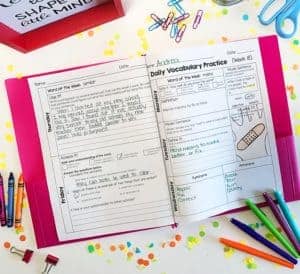
By Thursday, students have a solid working knowledge of the word. Now it is time to move their work to the next level. The open-ended format provides freedom to connect to each child’s personal background experience.
Students are asked to write a short paragraph (or a sentence or two, for younger learners) that utilizes the word. The writing must clearly show an understanding of the definition.
This offers the teacher an opportunity to formatively assess student progress and provide support to clarify misconceptions.
The brevity of the task keeps students from feeling overwhelmed as they begin moving from a more verbally-focused use of the new word to using it in their writing.
Friday: Application in Context
Friday’s tasks continue to build on Thursday’s higher-level application. Initially, students are asked to re-rate their understanding of the word and its definition. However, the remaining time is spent applying their knowledge of the word to answer questions.
Both multiple-choice and short answer questions are included.
Students are exposed to the week’s word in context without the scaffolds provided earlier in the week. This simulates the way students might see these words in a classroom assignment or on standardized assessments. It also gives the teacher a good sense of where students are in terms of mastery.
What other tools are included?
There are two other core components to this program.
Progress Assessments
First is the quarterly assessment, which is designed to formally monitor retention of the previously taught vocabulary.
You’ll likely hear these terms incorporated into academic conversations and utilized on assignments. However, it is important to continue to monitor student’s understanding to ensure there isn’t confusion as new words are introduced.
These quarterly assessments are simple and easy to grade, with answer keys included. They provide a good look into who might need additional intervention supports for vocabulary. They also give data that can be provided to an RTI or MTSS team during a student data meeting.
Word Wall & Student Dictionary Cards
A set of vocabulary cards is provided for all words in the set. The cards have a simple design to prevent distraction. They are also blackline so they can be printed on colorful paper or cardstock, if desired. There are two sizes included in each set – large and small.
The large cards are great for word walls or pocket charts. The bold lettering can be easily seen and helps students when it comes to recalling and spelling the words.
The small set is ideal for creating vocabulary rings or student dictionaries. They can also be provided to parents as a way to help them review these words at home.
Why only one word per week?
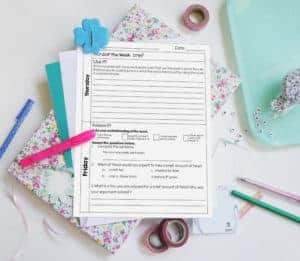
The word-a-week format was specifically selected to help build a deep understanding of the meaning of the word and to give students time to incorporate that knowledge into their schema.
Many programs brag about their academic word lists and the number of new words covered each week. These programs take a great deal of time and just skim the surface of the new vocabulary.
Research shows short, focused practice actually leads to higher mastery rates. The 10-minute per day format with a singular word of the week lends itself to that perfectly.
Making the connections between the vocabulary they already know and the new word promotes mastery. It also helps students deepen their knowledge of the academic language they already know. Rather than build a surface level understanding of 5-10 new words, this program is designed so that once a word has been taught, students truly know and can use it.
Want to know more?
Want to know more about the research on academic vocabulary and student outcomes? Here’s an article that outlines the importance of academic vocabulary for students.
Wish you could try it out with your students?


